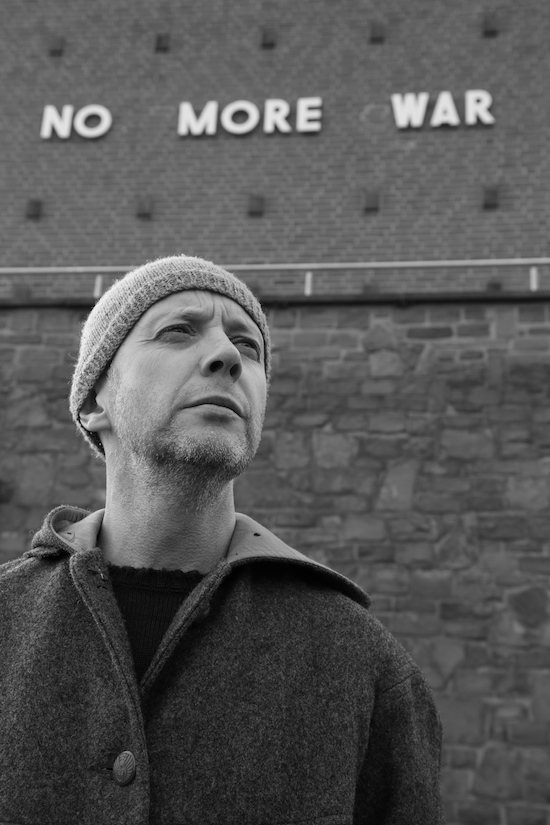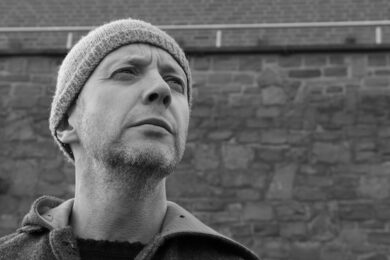Roy Wilkinson by Andrew Cotterill
"I’ve got a few visual prompts here," announces Roy Wilkinson. "It’s going to be a multimedia extravaganza," he says as he waves a brochure in front of his webcam. We’ve been chatting about museums and museum funding for the better part of a half hour – the pamphlet in his hand relates to one in Birmingham. We’re meant to be talking about Dark Lustre, his ongoing, serialised "non-nonfiction" book, and in a way, we are. While Dark Lustre is ostensibly the story of a mysterious death in Devon, Nazi gold, and a rock band called The Countess Marie-José de la Barre d’Erquelinnes Hextet, it covers a lot of territory. One passage might pivot from bakelite doorknobs to the history of the pasty. For lovers of the tangential, it’s a marvel.
Wilkinson is no stranger to tangents. As the music journalist older brother of Hamilton and Yan of British Sea Power and the band’s former manager, he was perfectly positioned to author one of the great rock memoirs, Do It For Your Mum: One Band, One Dad, One World War – A Story Of British Sea Power, Rock Dreams And Family Farce, but the book draws as much strength from the power of its asides as it does from BSP and Wilkinson’s delightfully eccentric family. You’re as likely to get a brief account of the ramifications of the Battle Of Lewes or the Cumbrian origins of the pencil or a somewhat lengthy account of Geoff Goddard’s recording career, a bio within a bio. Wilkinson is just that sort of writer. That very same omnivorous, seemingly endless intellectual curiosity is evident on every page of Dark Lustre as he weaves weird threads into a strangely unified tapestry filigreed with 100 quid twelve-inch singles and leather-covered Messerschmitt KR200 automobiles and the predatory capitalism of modelmaking. And crisp packets.
"Yeah, I’m quite fascinated by the rubric and the text you get on crisp packets," says Wilkinson. "There’s so much of it, in so many languages. It’s translated into Bulgarian and Arabic dialects. You see what I can only describe as Arabic scripts on the back, and it looks beautiful, but I have no idea what it means."
And so, eventually, in the pages of Dark Lustre, as one of our protagonists, Tommy Quantox inspects a German snack, we see in a smaller, sans-serif font set off from the surrounding type:
"Bio-Kartoffelchips Meersalz
Rohstoffe aus kontrolliert biologischem Anbau
gemäß EG-ÖKO-Verordnung
Organic potato chips sea salt
Raw materials from controlled organic cultivation
according to EU organic regulations"
At that moment, carefully arranged on the page by Wilkinson’s old friend and collaborator, Wilf Dickie of EM&EN, the packet text is as strange and important as anything in the six-part narrative. Dark Lustre is full of cleverly designed typographic experimentation by which the mundane is made less so, elevated – however briefly – to a central concern as diverting to the reader as Nazi gold (often NAZI GOLD writ massively on the page) or a deadly fall or a Cornish rocker in academia. It is also, perhaps, as adequate an analogue for the inner workings of Wilkinson’s mind as we readers could hope for.
I’m curious about the genesis of the project in general.
Roy Wilkinson: Well, I’ve gradually been working on it for quite a while, since soon after Do It For Your Mum came out, the better part of ten years ago. That was the first book I’d written, and I enjoyed that whole process. Without wishing to be too specific right now, there were very specific inspirations for the two main characters. They’re not the same as those people, but the real people live within them. So, it was that, and as a journalist, there were lots of things I wanted to write about. But, you know, it’s hard to get commissions to write about the things you particularly want to write about. And I’m in Devon, out of the way. I’m out of the media world and have been for a while. Kind of by my own volition, to a fair degree.
What drove the choice to serialise the book?
RW: This was a gradual agglomeration of an idea. I came to the conclusion that I wanted to write this book completely without the publishing industry in Britain, for various reasons. I thought, "I’m just going to do this myself." I haven’t taken it to any agents, or publishers. I did talk to one person I know [in publishing] about it, and his take was basically the same as mine. He said, "No, you want to do this yourself." He told me that if he took this book – I resist calling it a novel and I resist calling it fiction so, I call it "non-nonfiction" or "an alphanumeric fictive progression" – which I do with a smile in my voice. It’s meant to be slightly daft, in hopefully kind of an appealing way.
Anyway, I said, "As a publisher, what are they going to give me for an advance?" He said, "I don’t know, like two grand." And you know, I’ve sold half so far, and if I sell them all – I’m not gonna make a fortune, but I’ll make a fair bit more than two grand.
In terms of six instalments, there’s a certain density of information in the book. So, I began to think that it might actually work better if people get it and they’ve got like 20,000 words to digest. You might encourage them to take their time a bit more. Although some people have read it really quickly, which slightly alarms me. I’m a really slow reader. I couldn’t read those two books in one day. Anyway, so I thought that it suited the contents and the style of the book, and frankly, I was looking for a gimmick. Now, I was gonna say "novelty". It’s not a novelty, because it’s an age-old publishing practice – Dickens, Victor Hugo. I think one of his books was published in something like 140 instalments. So, you’re basically having a thousand words in the newspaper maybe every day. So, in a slightly tongue-in-cheek way I’m juxtaposing myself with Dickens and Victor Hugo. It’s kind of a joking self-aggrandizement in that way. "I’m reinventing this glorious literary tradition." It also takes the book towards other kinds of literature, like comics or catalogs or museum brochures, or even leaflets or crisp packets.
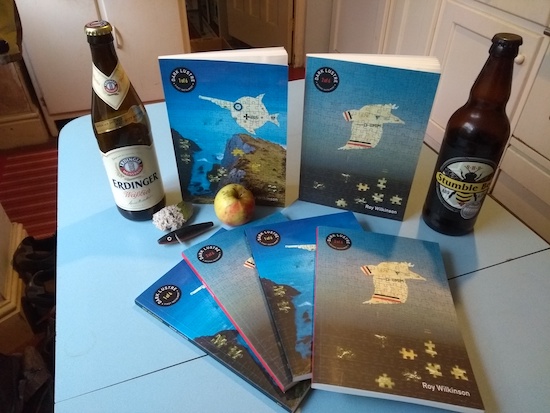
The first two instalments of Dark Lustre
In America, we had all these pulp detective and science fiction magazines, things like that. Which weren’t comics, but they were comic adjacent. And the seriality of Dark Lustre does imbue it with that sort of feeling.
RW: It wasn’t unintentional. And also, I’m a bit of a dosser. I’m not someone who’s worked. Application sometimes comes hard to me. So, I’ve written one book, and this became, in my mind, kind of a joke afterwards. But one must expand one’s oeuvre. Suddenly, I’ve gone from one book to seven. On a stroke, I am massively extensive in my outputs [laughs].
Something that’s gathered momentum with this book is the idea of the path of most resistance. I am the production editor. I am the press office. I have a friend I’ve known since I was 14, Wilf Dickie, who’s this expert design backup on how to realise a book. You know, I think it looks quite good.
Anyway, so the path of most resistance: In the book, Pamela from the band The Hextet is following the path of most resistance. Just doing things your own way, which takes more time, is more difficult, because you’re having to learn that thing as you go along. But in some ways, in a lot of ways, it’s more interesting. As an extension of that, a lot of bands I like would follow a path of most resistance. Bands like Earl Brutus – not a very well-known British band. They’re an interesting band, completely unsuccessful, but very interesting. They describe themselves as Kraftwerk caught wanking by their dad. A very disruptive band. They don’t exist anymore. Or Laibach. Even people like the Wu-Tang Clan. And particularly, the person that comes most to mind is Iggy Pop and The Stooges. Iggy is one of my favourite people, one of my three favourite musicians of all time. I’ve had the pleasure of interviewing him a couple times, and I was very fortunate because I got to spend quite a bit of time with him. Obviously, as you know, he’s a very bright, lucid character. I mean, a lot of the time, it is chemically accelerated. But The Stooges are living in this world almost of abnegation or almost wilfully sabotaging themselves, because their activity is so driven in a certain way. It’s not surprising that they weren’t successful because they were the archetype of a brilliant band following the path of most resistance.
So, to some extent, in my mind, I’m following that. I do everything from page to post. My next tranche of hopeful marketing dissemination includes Iggy Pop and the provocative Berlin art-rock duo Cobra Killer. The Hextet is keen on them, as is Tommy Quantox. I find them quite magnetic. Here we go, one of my visual clues. Visual prompts. [Roy holds a CD copy of Trust Me by Trost in front of the webcam.] This is Anika Line Trost’s solo album, which I really like. That’s her sat beside a mute swan. I assumed it was stuffed. She said, "Oh, no, it’s a real swan."
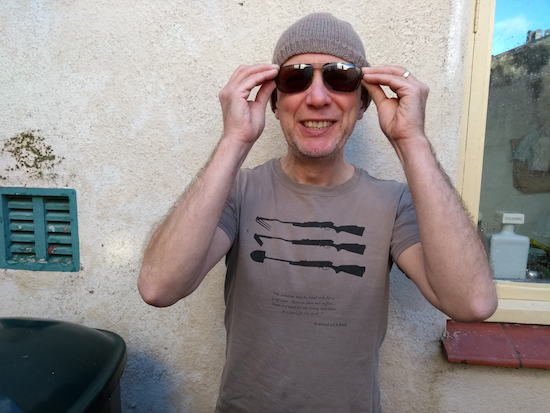
Why do you think music writers love to make up fake bands? What drew you to do it?
RW: Who wouldn’t want to make up band names? A great band name just seems like such a wonderful thing, a world in itself: The Fall, Kraftwerk, Earl Brutus, Felt, Public Enemy, Cornershop, Black Box Recorder, The Velvet Underground. I’m quite proud of the band names in Dark Lustre. There’s Interfered With By Stone Age Man, the post-rock Sunn O))))-type band with an amazing female singer. There’s a band in a later instalment of the book called Terminal 4, which seemed like the ideal name for a young four-piece of know-it-all post-everything nihilists. I’ve also made up names for real bands. I can’t say which bands – one of them paid me a fair bit of money. There was even a contract, for a name and other ideas.
In the book, you paint a really magical picture of the West Country. It feels like the sort of perspective that like an outsider who is very familiar with the place would have.
RW: I have no connection with the area. We moved here ten years ago, because Mary, my wife, wanted to. She has family in the area – she used to come here a lot as a child. She has relatives who have lived here for a long time. It’s a beautiful place. I’ve come to like it more and more over those ten years, actually. I live in South Devon. The book is set in North Devon, which is, generally speaking, a fair bit poorer in many ways. Someone I knew of, who was from that area – he had a bearing on the book. And I just spent a bit of time up there. The coast there is on the Atlantic Ocean – the Bristol Channel going out into the Atlantic. It’s kind of wilder, just in terms of meteorological conditions. And the population, it’s a bit more – I don’t know how to say it – visceral in some ways. So for me, visiting, it’s a very fascinating place, just in terms of topography. And when you’re out somewhere, you might bump into someone just a bit eccentric.
It’s somewhere you go to live and not be noticed. And in terms of living off the grid, there are people – almost invariably men – around there who are doing it, you know, in a quite weird and slightly alarming way. Even as an old bloke, I’m like, "Well, if I end up going in this guy’s house, I’ll be quite scared," you know?
Yeah, and Dark Lustre is populated with eccentrics.
RW: Especially in parts of the coast around here, you get the same effect. You go to out of the way places and meet people who are talking in a dialect that you need subtitles for. I’m not being condescending or kind of ethnographic in that. It’s just fascinating. Someone like Lol, Tommy’s friend. He’s got some of that, talking in a way that’s almost a language of his own. Yeah, really charismatic.
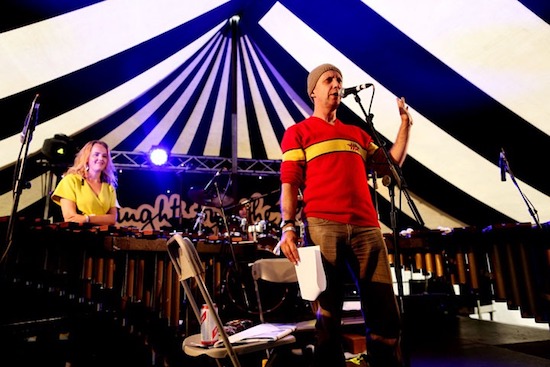
Roy Wilkinson live at Port Eliot festival with Marimba duo Malleticious
You describe Lol’s way with language in a sentence full of alliterative "r" sounds. It really drills it into your head, how this guy’s speaking and how it’s distinct from, say, Tommy.
RW: Inventing dialogue, to me, is something entirely new. I’m used to dealing with dialogue – directly quoting someone from an interview. Within reason, I’ve tried to make the dialogue a certain way; when people speak, they don’t finish sentences. It’s broken up. Initially, the dialogue in the book was much more broken up. But it was just too disruptive, in my opinion.
In the book, while researching Nazi gold, Tommy takes a deep dive into "Nazi nutter-dom". Was researching that psychologically taxing in any way?
RW: Not really for me, because I find myself reading about the Third Reich a fair bit anyway. I have read really quite a lot on these arch-wankers over the years. One of the things the book is doing is looking at that. Why are we still so fascinated by these people and these events now, 75 years on?
I think part of it is clearly down to aesthetics and the look – the Nazis did have such a powerful and modernist look, a look ahead of its time, in both their uniforms and their machines. I remember looking at a photo of a Messerchmitt 262, a Nazi jet fighter, at the lettering and colour scheme. It was like some unknown Peter Saville album sleeve. This Me-262 was also on the sleeve of an album by the Blue Öyster Cult, a group that has a Jewish co-frontperson, for Lord’s sake! I was talking to Julian Cope a couple of years ago. He’s interested in aircraft and the Nazi war. I remember him just saying, "Yeah, the Luftwaffe were mods." You can see what he meant – sharp clothing, and elite and on speed too. Like a lot of Nazis, the armed forces were on Pervitin, branded Nazi amphetamine.
A second thing that I like to believe regarding this interest in the Nazis is that World War II kind of had a happy ending. The baddies – the worst baddies – lost, and the main Nazi figureheads all died, came to horrible ends. The Nazis really left it in no doubt that they were a bad lot. I visited Germany a few times doing research for the book. I went to Berchtesgaden, where Hitler had his mountain HQ, the Berghof. On the site now there’s a NS-Dokumentationszentrum, a "Documentation Centre for the History of National Socialism". There are several of these centres in Germany today, centres full of documents, just putting on record what happened and acting as rebuke to the Holocaust-denial crapheads. At the Doku centre at the Berghof site there was a short film with interviews with the relatives of people who’d lived on this mountainside before the Nazis came. After Hitler built his house there, all the other Nazi bigwigs wanted their own Alpine homes next door. The local farmers were thrown off the mountainside, told to leave or they might get burned out. They were kind of told, "Have you heard of these concentration camps? All kinds of people end up in these camps…" The Nazis couldn’t even be nice to Bavarian farmers. I mean, is there a more obvious exemplar of their Aryan ideal than Bavarian farmers? Well done Doku centre for finding a new way to communicate the utter hypocrisy of these utterly, utterly solipsistic wankers and bastards.

[Roy takes out a boxed model of the solar system and shows it to the camera]
OK, your model. In the book there are a lot of references to Lol’s modelmaking. They seem to be subtly poking fun at the whole serialisation aspect of the book in a way, right?
RW: Perhaps, but to be perfectly honest, that wasn’t massively intended. But it is a kind of comment, it ties in, yes. The partworks of that sort of modelmaking is just – this is one I bought – it’s a fascinating oddity. I bought the first one at 99 pence, like a loss leader.
So, this first part is 99 pence in the local newsagent off the high street, which probably no longer exists. But it’s called, on the back, "your own precision-engineered orrery," which is a word I’ve barely heard before. And you build this nutty collection of brass elements. By the time you do finish, it costs quite a lot of money. I can calculate the cost of this one thing and its more than 200 pounds. It’s like 300 quid. The submarine that Lol’s building is a real thing. It’s gonna cost about 500 quid. Now, the slight tragedy or bathos in this thing is that a lot of people will buy half of them. Just incompletion, you know? The most absurd one that I came across, to my mind, was to build your own 3D printer in monthly parts, which almost seemed like some kind of Dadaist venture.
Do you build models?
RW: I have some models, which I bought recently, but I don’t build them. I think by building them you make them incomplete. That’s what they are. It’s the plastic thing on sprues with a sheet of decals. They are often quite beautiful, quite striking. Traditionally, the British ones have illustrations instead of photos, and it’s become a complete collector’s market of some classic Airfix artists, the originals of which are worth fairly substantial sums of money. So, I don’t build them. But Lol does. It’s an obvious thing, the idea of order in a world of chaos. The idea of completion or seeking to resolve something in some way. People make them to quite a high standard. To me, that’s a kind of tragedy, because people will build these models and make a diorama. And do it to a real state of high craft. It takes a lot of time, and when they’re finished, they’ve got something that, in a way, is almost kind of worthless. In a way, people are much more interested in the unfinished. What they want is an old, rare, unfinished kit. Whereas when you’ve finished it, what do you do with it?
You talked about seeking order in a disordered world, but the unfinished model kit is perfectly ordered. When you pull the kit out, it is as orderly a thing as can be. So, you’re going from perfect order to disorder, to maybe a state of imperfect orderliness, if you can finish the model – if you don’t screw it up.
RW: Lol, when he’s building a partwork, he might be seeking some kind of control in a world where one can’t have much control. But as you say, particularly if he doesn’t finish the item, he might be just adding more disturbance, more imperfection. So, it’s a world in which you can’t win. Once you get past the 99 pence one, it’s quite expensive, like six, seven, eight quid. And I assume the people who are buying these are not necessarily going to be wealthy.
Well, it’s kind of one of those things where it’s the difference between buying something in instalments and paying in full upfront.
RW: In a way, it’s a sort of predatory capitalism. It’s almost like a betting addiction, like trying to get someone addicted to it. You’re paying six quid for, like, three bits of wood at some point. This a classic, classic example of something that I would like to write about for a newspaper, but it gets to a stage where that market is so compromised. It’s so embattled financially. They’re commissioning less. I didn’t even bother to try and say, "Can I write 2000 words on partworks?"
So, I wanted to write a bit about partworks, which I did. Then, by extension, "OK, I’ll do the book as a partwork as well." But I’m much less invidious. You don’t have to make anything, and I hope, by the end, it’s gonna be worth more than you paid for it.

